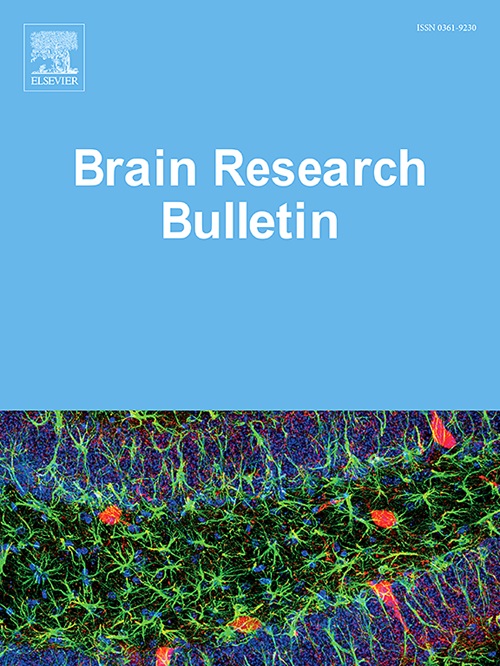海马的综合代谢组学和转录组学分析揭示了牛磺酸代谢和鞘脂代谢失调与睡眠剥夺引起的记忆障碍有关。
IF 3.7
3区 医学
Q2 NEUROSCIENCES
引用次数: 0
摘要
睡眠在恢复和修复身体、巩固记忆、调节情绪、维持新陈代谢等方面起着至关重要的作用。众所周知,睡眠不足会损害认知功能。在这项研究中,我们通过海马体代谢组学和转录组学的联合分析,研究了睡眠剥夺引起的记忆障碍的机制。以8周龄小鼠为研究对象,采用睡眠剥夺室建立睡眠剥夺(SD)模型。采用新目标识别测试(NOR)和y迷宫测试来评估小鼠的行为结果。提取海马,采用非靶向代谢组学或转录组学高通量测序方法进行研究。进行了综合分析,以阐明代谢和遗传变化。行为测试显示SD组出现记忆障碍。代谢组学分析鉴定出84种差异表达代谢物(dem),其中正离子模式下有12种,负离子模式下有72种。分析显示,睡眠剥夺导致了几种代谢途径的异常,在甘油磷脂代谢、亚油酸代谢、丙氨酸、天冬氨酸、谷氨酸代谢、牛磺酸和次牛磺酸代谢以及嘌呤代谢中观察到特别明显的影响。转录组学分析发现97个差异表达基因(deg)(51个下调,46个上调)。代谢组学和转录组学的综合分析表明,睡眠剥夺可能通过影响记忆来调节牛磺酸和次牛磺酸代谢以及鞘脂代谢。我们的结果提示SD小鼠海马出现严重的代谢紊乱,可以为机制研究提供依据。本文章由计算机程序翻译,如有差异,请以英文原文为准。
Integrative metabolomics and transcriptomics analysis of hippocampus reveals taurine metabolism and sphingolipid metabolism dysregulation associated with sleep deprivation-induced memory impairment
Sleep plays a crucial role in restoring and repairing the body, consolidating memory, regulating emotions, maintaining metabolic and so on. Sleep deprivation is known to impair cognitive functions. In this study, we investigated the mechanisms underlying memory impairment induced by sleep deprivation through a combined metabolomic and transcriptomic analysis of hippocampus. Eight-week-old mice were selected as the study subjects and the sleep deprivation chamber was used to establish a sleep deprivation model. Novel object recognition tests (NOR), and Y-maze tests were used to assess the behavioral outcomes in mice. The hippocampus were extracted and studied using the untargeted metabolomics or transcriptomics high-throughput sequencing method. An integrative analysis was conducted to elucidate the metabolic and genetic changes. Behavioral tests showed that sleep-deprived mice exhibited memory impairment. Metabolomic analysis identified 84 differentially expressed metabolites (DEMs), including 12 under the positive ion mode and 72 under the negative ion mode. The analysis revealed that sleep deprivation caused abnormalities in several metabolic pathways, with particularly pronounced effects observed in glycerophospholipid metabolism, linoieic acid metabolism, alanine, aspartate, glutamate metabolism, taurine and hypotaurine metabolism, and purine metabolism. While transcriptomic analysis releaved 97 differentially expressed genes (DEGs) (51 were down-regulated and 46 were up-regulated DEGs). Integrative analysis of the metabolomic and transcriptomic identified profiles showed that sleep deprivation may regulate taurine and hypotaurine metabolism and sphingolipid metabolism, there by influencing memory. Our results prompt severe metabolic disturbances occur in the hippocampus with sleep deprivation in mice, which can provide a basis for the mechanism research.
求助全文
通过发布文献求助,成功后即可免费获取论文全文。
去求助
来源期刊

Brain Research Bulletin
医学-神经科学
CiteScore
6.90
自引率
2.60%
发文量
253
审稿时长
67 days
期刊介绍:
The Brain Research Bulletin (BRB) aims to publish novel work that advances our knowledge of molecular and cellular mechanisms that underlie neural network properties associated with behavior, cognition and other brain functions during neurodevelopment and in the adult. Although clinical research is out of the Journal''s scope, the BRB also aims to publish translation research that provides insight into biological mechanisms and processes associated with neurodegeneration mechanisms, neurological diseases and neuropsychiatric disorders. The Journal is especially interested in research using novel methodologies, such as optogenetics, multielectrode array recordings and life imaging in wild-type and genetically-modified animal models, with the goal to advance our understanding of how neurons, glia and networks function in vivo.
 求助内容:
求助内容: 应助结果提醒方式:
应助结果提醒方式:


